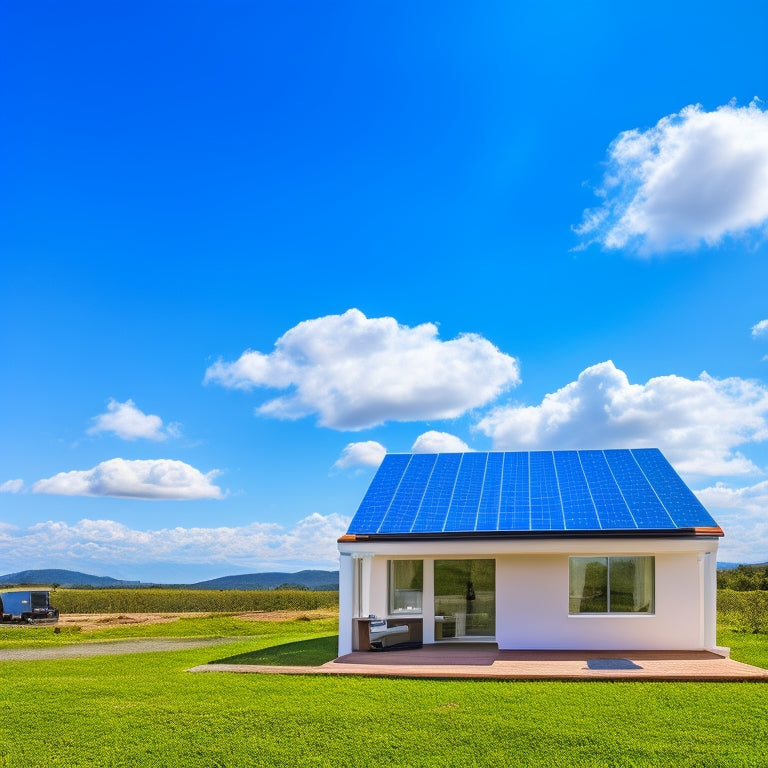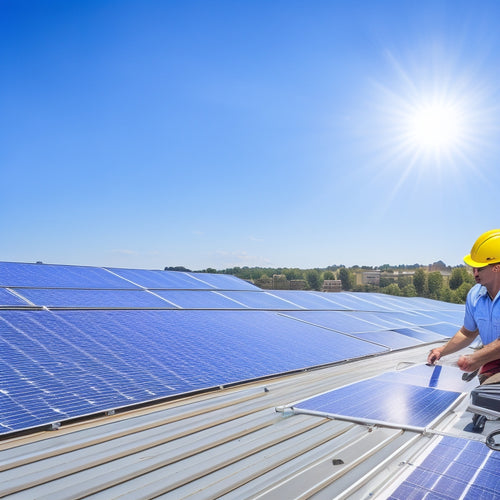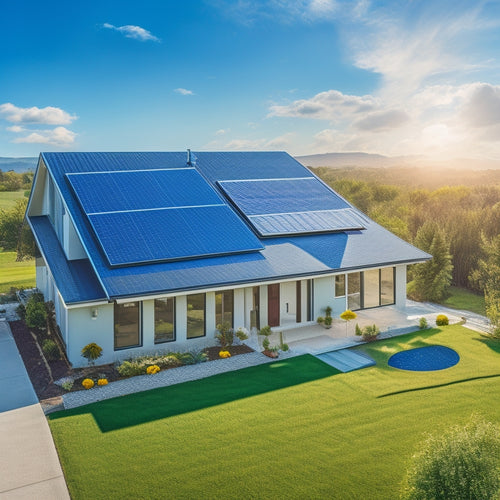
5 Essential Tips for Buying Home Solar Systems Online
Share
When purchasing a home solar system online, you'll want to evaluate your energy needs, selecting a system that fits your usage patterns. Choose high-efficiency equipment from a reputable retailer, making sure industry standards are met. Take into account installation costs, including labor fees and permits. Be sure to carefully review warranties, examining terms and conditions closely. By taking into account these essential factors, you'll be well on your way to making an informed purchase. Now, it's time to dive deeper into each of these critical considerations to guarantee your solar system meets your unique needs and expectations.
Key Takeaways
• Determine your energy needs by calculating your daily energy usage and identifying areas of inefficiency to size your solar system accurately.
• Select high-efficiency solar panels and compatible inverters from a reputable online retailer with authentic products and reliable warranties.
• Ensure the online retailer has a clear return and refund policy, dedicated customer support, and third-party certifications like UL or ETL.
• Factor in installation costs, including labor, permit fees, and equipment costs, and research local incentives like tax credits or rebates.
• Carefully review warranty documentation, paying attention to duration, coverage, and terms to ensure reliable manufacturer support.
Assessing Your Energy Needs
Determine your average daily energy usage in kilowatt-hours (kWh) by reviewing your past utility bills or using online energy calculators to get an accurate estimate. This step is important in evaluating your energy needs for a home solar system.
You'll want to calculate your total energy consumption over a specific period, typically a year, to understand your historical consumption patterns. This will help you determine the size of the solar system you need to meet your energy demands.
Conducting an energy audit can also help identify areas of energy inefficiency in your home, allowing you to make adjustments before installing your solar system. This audit will pinpoint energy-wasting appliances, lighting, and insulation, enabling you to optimize your energy usage.
Choosing the Right Equipment
With your energy needs assessed, you'll want to select high-efficiency solar panels and a compatible inverter that can convert DC power into usable AC electricity for your home. High-efficiency solar panels maximize energy production, reducing the required installation area. Look for panels with a high efficiency rating (>20%) and a durable design.
When choosing an inverter, consider battery compatibility to guarantee seamless integration with your energy storage system. A compatible inverter will optimize energy harvesting and reduce energy losses.
| Component | Key Considerations |
|---|---|
| Solar Panels | High efficiency (>20%), durable design |
| Inverter | Battery compatibility, high conversion efficiency |
| Mounting System | Durability, adjustability, and corrosion resistance |
| Monitoring System | Real-time energy monitoring, data analytics |
| Battery | Deep cycle, high capacity, and long lifespan |
Evaluating Online Retailer Credibility
You've selected your solar system components, now it's time to find a reputable online retailer to purchase from, ensuring your equipment is authentic and backed by reliable warranties and support.
When evaluating online retailers, it's important to assess their credibility to avoid counterfeit products and subpar services. Start by checking for third-party certifications, such as UL (Underwriters Laboratories) or ETL (Intertek), which guarantee the retailer's products meet industry standards.
Additionally, scrutinize customer reviews on independent review platforms, like Trustpilot or Yelp, to gauge the retailer's customer satisfaction and support quality. Be cautious of fake or paid reviews, and look for red flags like inconsistent ratings or overly positive feedback.
A reputable retailer should have a clear return and refund policy, as well as a dedicated customer support team. By doing your due diligence, you can confidently purchase your solar system from a trustworthy online retailer, ensuring a seamless and successful installation process.
Understanding System Installation Costs
Your solar system's installation costs will likely be the largest expense in your project, and understanding these costs is essential to budgeting and planning a successful installation.
When buying a home solar system online, it's important to factor in the costs associated with installation. Labor costs, including the installer's fee, will be a significant portion of your overall expense. Additionally, you'll need to take into account permit fees, which can vary depending on your location.
Rooftop access can also impact your installation costs, as installers may need to use specialized equipment to navigate complex rooflines. In some cases, electrical upgrades may be necessary to make sure your home can handle the increased power output.
On the bright side, local incentives, such as tax credits or rebates, can help offset these costs. Be sure to research and incorporate these incentives into your overall budget.
Reading and Reviewing Warranties
When purchasing a home solar system online, scrutinize the warranty documentation, as it outlines the manufacturer's commitment to repair or replace defective parts, protecting your investment. You should pay close attention to the warranty duration, as it varies between manufacturers. A longer warranty period typically indicates a manufacturer's confidence in their product's reliability. Look for manufacturers that offer a warranty of at least 25 years for the solar panels and 10 years for the inverters.
It's essential to review the warranty terms and conditions to understand what's covered and what's not. Check if the warranty covers labor costs, shipping, and replacement parts. A thorough warranty can save you thousands of dollars in repair and replacement costs.
Manufacturer reliability is important, so research the manufacturer's reputation and customer reviews to make sure you're buying from a reputable company. A trustworthy manufacturer will stand behind their product and provide excellent customer support.
Frequently Asked Questions
Can I Install a Home Solar System on a Rented Property?
You're wondering if you can install a home solar system on a rented property? Yes, you can, but you'll need to get your landlord's approval, as stated in your rental agreement, to guarantee a smooth and legally-binding installation process.
Will Solar Panels Work During a Power Outage?
You'll be glad to know that solar panels can work during a power outage if you have a grid backup system with energy storage, like a battery, to provide power when the grid is down.
Can I Add More Panels to My System Later?
You're wondering if you can add more panels to your system later? Absolutely! Most systems are designed for system expansion, allowing you to upgrade or add panels as your energy needs grow, making panel upgrades a seamless process.
Do Solar Panels Generate Electricity on Cloudy Days?
You'll find that solar panels still generate electricity on cloudy days, albeit with reduced energy output. Cloudy performance is typically 10-20% of peak capacity, so you'll still produce some power, just not as much as on sunny days.
Will My Homeowners' Insurance Cover My Solar System?
'A million things can go wrong, but don't worry, you've got this! Your homeowners' insurance likely covers your solar system, but review your policy to make sure it's included in the coverage limits, and understand the claim process and policy exclusions to avoid surprises.'
Related Posts
-

What Does Solar Panel Maintenance Really Cost?
You can expect to pay between $1,500 to $2,500 per year for solar panel maintenance, with costs influenced by your sy...
-

5 Best Steps to Installing Solar Panels at Home
You're about to start on a journey to harness the power of solar energy at home. First, assess your home's solar pote...
-

7 Best Financial Incentives for Residential Homeowners
You're entitled to a range of financial incentives that can help offset the costs of owning a home, from federal tax ...


